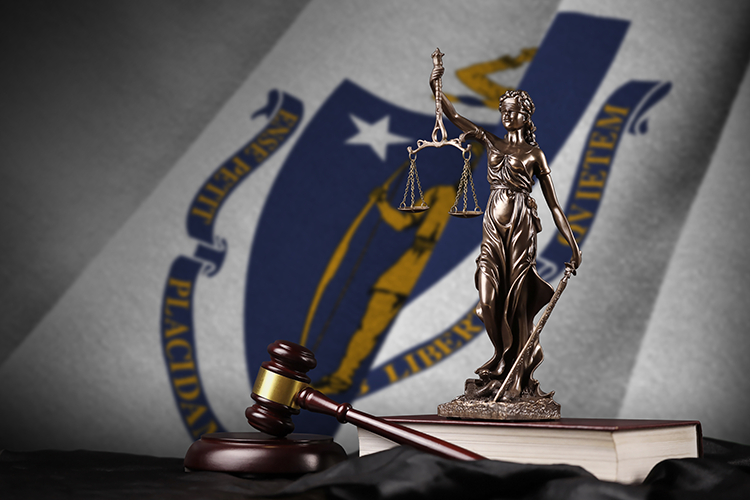Ex-prosecutor disbarred for disclosure failures in drug-lab scandal; supervisor, underling get different sanctions

The Massachusetts Supreme Judicial Court ordered disbarment for Anne K. Kaczmarek, a former assistant attorney general, for “intentional and egregious misconduct.” Image from Shutterstock.
A former assistant attorney general who oversaw the investigation and prosecution of a drug-using chemist at a Massachusetts crime lab has been disbarred for failing to disclose the full extent of the worker’s potential misconduct to affected drug defendants.
The Massachusetts Supreme Judicial Court ordered disbarment for Anne K. Kaczmarek for “intentional and egregious misconduct”—withholding exculpatory evidence uncovered in the investigation of chemist Sonja Farak, which violated the due process rights of thousands of criminal defendants.
Bloomberg Law, WBUR and Law360 have coverage, while the Legal Profession Blog published highlights from the Aug. 31 opinion.
A supervisor and underling who relied on Kaczmarek’s assurances received differing punishments. The Massachusetts Supreme Judicial Court ordered a year-and-a-day suspension for a junior assistant attorney general, Kris C. Foster, while imposing a public reprimand on Kaczmarek’s supervisor, John C. Verner.
Foster had helped Kaczmarek with discovery requests and had signed her name to court filings.
“It should have been abundantly clear to Foster that it was her responsibility to verify the truth of her own representations,” the Massachusetts Supreme Judicial Court said.
Verner had supervised more than 100 people, including about 50 lawyers, as criminal bureau chief at the state attorney general’s office. Because Kaczmarek had experience handling the case of another chemist, Verner “was not required to engage in the sort of oversight that might have been required of a less experienced attorney,” the court said.
The court said Verner’s reliance on Kaczmarek’s false representations about turning over exculpatory information was “reasonable and in good faith.”
Farak had worked at the Massachusetts drug lab in Amherst, Massachusetts. Her job was to test suspected drugs to determine whether they were illegal. She was arrested in 2013 and admitted that she stole laboratory drugs and was under the influence of methamphetamine, cocaine, LSD and other drugs while working and testifying.
Kaczmarek operated on the theory that Farak’s drug use and tampering was confined to cocaine and began in late 2012; she believed that a 2005 case where the cocaine weight became lighter and a March 2012 case in which Farak returned different looking suspected oxycodone pills to police were “outliers.”
The evidence, however, was potentially exculpatory. The 2012 oxycodone case was eventually disclosed to at least one district attorney but the 2005 cocaine case was not turned over, the court said.
Kaczmarek also failed to turn over to district attorneys mental-health counseling worksheets found in Farak’s car that detailed her struggles with drug addiction and her failed efforts to resist using drugs at work. And Kaczmarek did not disclose a urinalysis showing a positive test for cocaine near the time of her arrest.
Handwritten notes on the worksheets suggested Farak’s drug problems possibly began earlier than what was thought. Kaczmarek had voiced concerns that the worksheets were privileged, and she did not include them in her grand jury presentation.
Farak pleaded guilty in January 2014 to evidence tampering, larceny of a controlled substance from a dispensary, and unlawful possession of a Class B controlled substance.
It wasn’t until November 2014 that the state attorney general’s office produced the mental health worksheets “and other papers that supported a strong inference that Farak’s misconduct began before 2012,” the court said.
In October 2018, the Massachusetts Supreme Judicial Court ordered the dismissal of all convictions affected by Farak’s misconduct, beginning on or after January 2009. Thousands of convictions were tossed.
Kaczmarek had argued that the failure to disclose exculpatory information can’t be attributed solely to her because institutional failures and Farak’s misconduct were also contributing causes.
The court agreed that Kaczmarek was not solely responsible but said she “bears the greatest responsibility, as well as the greatest culpability.”
“As a result of Kaczmarek’s intentional and egregious misconduct, the due process rights of thousands of criminal defendants were violated for a prolonged period based on the withholding of exculpatory evidence,” the court said.
Lawyers for Verner said told Law360 and Bloomberg Law that they were pleased that the Massachusetts Supreme Judicial Court agreed that only a public reprimand was appropriate.
Lawyers for Kaczmarek did not immediately reply to the ABA Journal’s emailed request for comment.
Allen N. David of Peabody & Arnold, a lawyer for Foster, told the Journal that the extra day tacked on to the one-year suspension means that she will have to reapply for admission to the bar instead of being automatically reinstated.
“The result was disappointing,” David says. “We were asking for a reprimand based on the fact that she was acting on information that she got from three different sources,” including a state police detective and her immediate supervisor.
David says Foster and Verner, the criminal bureau chief, relied on Kaczmarek’s assurance that all the exculpatory material had been turned over. Yet Foster was suspended, while Verner received only a reprimand.
“There seems to be a disparity between supervisors and subordinates in terms of how much they can rely on representations of colleagues. I think that’s a troubling development for the bar,” David says.
Write a letter to the editor, share a story tip or update, or report an error.


